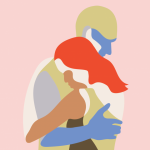Caring With Compassion: How Caregivers Help
- When you suddenly find yourself in the role of caregiver for a loved one with cancer, the lifestyle adjustment can be jarring.
- “I think the biggest role for the caregiver is: if the person has some worrisome symptom or signs, the caregiver [must] make sure that that person gets it attended to. Either by calling the physician or by going to the emergency room (if that’s the appropriate thing to do),” Dr. Lauren Pinter-Brown tells SurvivorNet.
- When you’re a caregiver, it’s important to ensure you’re taking care of yourself, too — so learning to manage your new responsibilities in a way that doesn’t feel overwhelming is key.
- If you need help with finances, SurvivorNet provides resources you can consider to get assistance with the cancer bills.
Guidance for Cancer Caregivers
Read More“The caregiver is the patient’s advocate.”
Dr. Pinter-Brown explains, “They’re advocating particularly when the person has a symptom. [If the patient says] ‘I’m tired. I don’t feel like coming in, I don’t really feel that good.’
“The caregiver goes, ‘Nope, I’m putting you in the car. And here we go.'”
Be the Advocate — and the Extra Set of Ears
Cancer care can involve multiple specialists, complicated medications, and dense information delivered at a rapid pace. During appointments, the patient may be anxious or fatigued.
What caregivers can do:
- Take notes during every visit. Write down medication names, dosages, and follow-up dates.
- Ask questions if something isn’t clear. (“What side effects should we call about?” or “What does this scan result mean?”)
- Clarify instructions before leaving the office.
- Keep a folder or phone app with all test results and contact numbers.
This advocacy isn’t about control — it’s about partnership. When patients feel too tired to speak up, caregivers ensure their concerns are heard.
Build a Routine Around the Patient and Yourself
Structure also helps everyone breathe easier, especially amid relapse or recurrence.
For the patient
- Create a daily checklist for medications, hydration, and short walks.
- Plan meals that fit treatment side effects (soft foods, mild flavors).
- Use a calendar app for appointments and lab draws.
For yourself
- Schedule short breaks. Even ten minutes outside or a quiet cup of coffee can reset your energy.
- Keep your own medical and sleep routines. Caregivers often ignore their health until burnout hits.
- Ask family or friends to cover shifts so you can rest.
Caregiving isn’t just about medical advocacy — it’s also about the small, steady acts that keep a person going through treatment.
“The patient is expected to have a caregiver,” Dr. Pinter-Brown advises.
“What’s the caregiver going to do? The caregiver’s going to make sure they have nutrition. That they’re probably not doing things like washing their clothes and doing the marketing. The caregiver might take them to the doctor — because they’re going to be going to the doctor pretty frequently.”
These practical details might sound simple, but they are vital. Cancer treatment often leaves patients too tired to cook, drive, or keep up with basic chores. Having someone to share those daily responsibilities allows patients to focus on healing — and reminds them that they’re not fighting this disease alone.
Recognize Caregiver Burnout and Prevent It Early
People who take on caregiving roles often find themselves neglecting their own basic needs. But you’ll be a better caregiver if you also prioritize caring for yourself. Taking care of your health whether that be with diet, exercise, or making time for activities you enjoy is still critically important.
Studies show that caregivers of cancer patients face higher rates of anxiety, insomnia, and depression than the general population. The constant vigilance takes a toll.
More On Caregiving
- ‘A Sacred and Blessed Calling’ – Managing Life As a Caregiver
- Here Are Top Tips For Cancer Caregivers To Help Them Through The Process
- How to Be a Better Caregiver for Your Loved One
- Meeting the Needs of Black Caregivers
- The First Steps to Take as a Caregiver When a Loved One is Diagnosed With Cancer
- Where Cancer Caregivers Can Get Help With Finances: Coping With the Bills
Warning signs of burnout:
- Exhaustion that doesn’t improve with rest
- Irritability or resentment toward the situation
- Trouble concentrating
- Withdrawing from friends or hobbies
- Feeling “numb” or detached
When you start to notice these signs, reach out to your primary doctor, a therapist, a faith leader, or a support group. Many cancer centers run free caregiver workshops and counseling sessions.
Self-care isn’t indulgence; it’s survival. A healthy caregiver means a safer patient.
Caregiving: An Opportunity for Healing
Learn more about SurvivorNet's rigorous medical review process.






